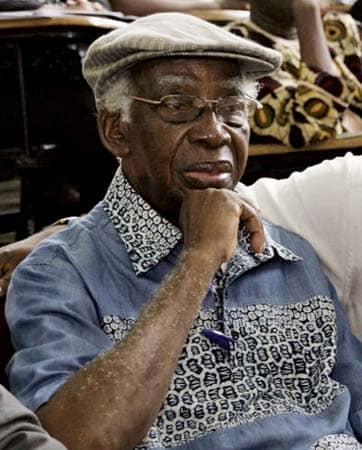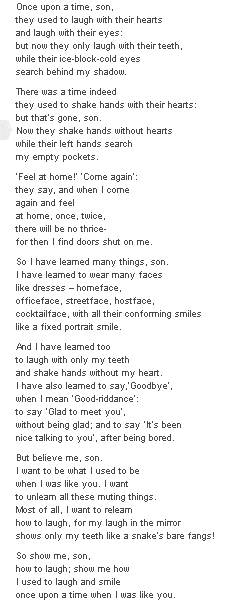what does the speaker want the people he is addressing to do?
Andrew has a bully interest in all aspects of poetry and writes extensively on the subject. His poems are published online and in print.

Gabriel Okara
Gabriel Okara and a Summary of 'Once Upon a Time'
'Once Upon a Time' is a free verse verse form that focuses on a father'southward attitude to cultural change and times past, before the incoming Western culture affected the native African way of life.
In the verse form, the human (presumably a male parent) addresses the son, telling him in a rather cornball manner, how things used to be. People were different back then, more genuine it seemed, and that is what the speaker would like to do now—return to a restored world—if he can only acquire from the youngster.
Dorsum then, people weren't after your coin, they could look you lot in the eye and smile real smiles. Just present, although the smiling teeth are on evidence, and they'll shake your hand, all they want to know is your financial status.
And and so the poem progresses, the early stanzas revealing more than of the negative changes that take occurred during the father'due south lifetime. He is erstwhile enough to have watched decent human standards drop to the wayside as western ideals (together with capitalism) gradually took over.
The speaker wants to relearn from the as-yet-untainted son how to express joy and exist 18-carat again. It'due south rather a pathetic plea, coming from the adult to the youngster—for what can the son realistically exercise? Can the clocks exist put back? Can an ancient culture be retrieved from the overwhelming modern culture?
The themes are: how gild changes, cultural shift, capitalism and values.
Perhaps the tone is ironic. Perhaps the speaker knows deep within that he'll never regain that purity, that he won't be able to turn back time and relive life as a transformed person. That'south why the championship could exist from a fairy tale; the speaker's wishes are a fantasy.
Gabriel Okara (1921–2019) is considered to be ane of the showtime modern African poets. Born in Nigeria, he uses folklore, religion, myth and social issues to explore tradition and transition. His work kickoff appeared in the magazine Black Orpheus from 1957. This poem is included in his book The Fisherman's Invocation, published in 1978.
'Once Upon a Time' past Gabriel Okara

Stanza-by-Stanza Analysis of 'In one case Upon a Time'
'In one case Upon a Time' is a free verse poem of 43 lines, broken upward into 7 stanzas.
First Stanza
The commencement line suggests that this poem is going to be based on a story, is a kind of story or or fairy tale?
The speaker is addressing his son, and so this could well be a begetter beginning to explain how things used to be, how people 'they' used to express mirth with their hearts and eyes. Dorsum in the past.
In contrast, nowadays laughter is more of a show of teeth, and the eyes are cold and looking for something other than the real person.
Ringlet to Continue
Read More From Owlcation
And then already the nowadays is being judged by the by. And from what we tin can assemble from these commencement six lines, the speaker prefers the attitudes of the people from the by. There is the feeling that negative alter is here.
Second Stanza
The art of shaking hands has also inverse. In the past, a greeting was genuine, a person welcomed for who they were. But nowadays people milkshake hands with 1 centre on your status, your financial status.
People are no longer genuinely warm towards others. People are on the make, wanting to get something from y'all.
Third Stanza
People invite y'all round to their homes making out equally if you're important to them, simply if you don't measure up socially or your status isn't quite right, you're not invited once more.
The breach continues. People present are artificial and fickle because of the modify in civilisation.
Fourth Stanza
The starting time 3 stanzas outline the speaker's perception of changing culture and attitudes and values in his country.
This quaternary stanza describes how the speaker himself had to change and acquire in order to comply. He uses a comparison—faces to dresses—to highlight the various personas he took on, all the while smiling.
The repeated use of face affixed to diverse places and situations is highly visual.
Fifth Stanza
He too has become good at the heartless paw milkshake and hollow toothy smile, plus he knows how to deceive people with his farewells and welcomes and simulated politeness.
Basically, he is saying that he has become an integral role of this new culture. Information technology'southward been quite an didactics for him.
6th Stanza
But he is non happy beingness a conformist. He wants to regain a one-time innocence the youngster still holds. He wants no office of this new culture and all these muting things. That discussion muting means to deaden in this context.
What he wants almost is to be able to express mirth in innocence over again—he likens himself to a snake, his teeth concord something toxic, even dangerous.
7th Stanza
He comes clean. He wants the son to show him how to regain this lost innocence and truthful identity. How to express mirth and grinning like in the sometime days when he was young and carefree and the culture encouraged openness and honesty.
Literary/Poetic Devices
Ingemination
When ii or more words close together in a line begin with the same consonant, creating different sound textures:
easily without hearts . . . these muting things . . . So show me, son, . . . when I was
Assonance
When two or more words are close together in a line and accept like sounding vowels, again creating dissimilar sounds:
upon a time, son . . . similar a fixed portrait smile . . . was like you lot. I want . . .
Caesura
A break in a line where the reader pauses, usually through punctuation:
'Feel at home! Come again.'
they say, and when I come up
Enjambment
When a line runs on into the side by side with no cease or interruption, maintaining the sense. For instance the first ii lines of this stanza:
And I take learned too
to laugh with only my teeth
and milk shake hands without my eye.
Simile
When something is compared to a different thing, using the words like or every bit. For instance:
I accept learned to wear many faces/like dresses -
with all their conforming smiles/similar a fixed portrait smile.
similar a snake'southward blank fangs.
What Is the Tone of 'Once Upon a Time'?
The tone of 'Once Upon a Time' is nostalgic and peradventure a little ironic. The speaker dearly wishes to relearn how to smile a genuine smile once again, how to express joy without pretension—but will he really be able to learn from the youngster?
The speaker is earnest, he clearly wants to get back to a time he perceives every bit pure and innocent and skilful . . . in the old African culture, before the Western values crept and took over.
Sources
- Jstor
- African Writing
- The British Library
- AK Journals
© 2019 Andrew Spacey
Source: https://owlcation.com/humanities/Analysis-of-Poem-Once-Upon-A-Time-by-Gabriel-Okara
0 Response to "what does the speaker want the people he is addressing to do?"
Publicar un comentario